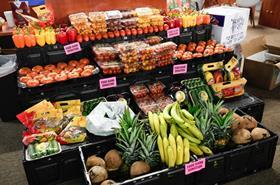
Food and agriculture advocacy group Sustain has called on government to release funds to help eradicate household food insecurity amid the deepening coronavirus crisis.
Where access to food is concerned the charity said its two biggest concerns were that people who don’t have enough money receive funds to buy food, and that if a person can’t leave the house to get food (because they are ill, old, disabled, medically vulnerable, self-isolating or caring for others), then somebody needs to know about this and deliver food to them in a safe way.
In a blog post, the group’s chief executive Kath Dalmeny, wrote: “Food banks have never been the answer, but with coronavirus this becomes far clearer.
“During Coronavirus, we cannot knowingly create a situation in which large numbers of people are forced to congregate at food banks to receive emergency food aid.
“And in any case, food banks cannot meet existing need, let alone a large and sudden increase, and are often run by older volunteers who may soon themselves need to self-isolate.”
She called on the Treasury and the Department for Work and Pensions (DWP) to “act immediately, to enable low-income households have the financial resilience to be able to self-isolate, and to relieve avoidable overwhelming pressure on local authorities and frontline charities.”
Her demands on the government were for it to:
- Suspend the five-week wait for Universal Credit and make the advance payment a grant, not a loan.
- Up-rate child benefit immediately when schools close to cover the cost of children’s food, to enable families to buy what they need, and suspend the two-child limit. Charities and academics are already calling for cash transfers to help families cope with school closures.
- Ensure there is adequate financial support available to people with the status of 'no recourse to public funds' so that they can afford to follow self-isolation advice.
- Make sick pay available to freelancers, temporary workers, those who are self-employed and those on zero-hour contracts.
- Pay cash grants to frontline charities that, alongside their main work, provide meals for especially vulnerable people, so that the charities can buy the food they need – for example, homeless shelters and domestic violence refuges.
- Give local authorities and other frontline public-sector providers sufficient money to make crisis grants or welfare assistance schemes to households in need – the £500 million Hardship Fundmade available in the chancellor’s budget could be a good start, if ring-fenced to help low-income households.
- Consider other ways to maximise household financial resilience, for example by capping or freezing utility bills, as done in Italy.
Relieved of the need to provide food for a large number of low-income households, she said local authorities, Local Resilience Forums (LRFs) and voluntary sector organisations could then focus their efforts on helping millions of older people and those with pre-existing health conditions.
Dalmeny stressed that public services and charities would be overwhelmed unless the DWP and Treasury inject money to help tens of thousands of households afford food.
At a micro level, communities are already starting to organise through social media to identify vulnerable individuals in their area and support them by delivering food and prescriptions.
“There are encouraging ideas for buddying schemes, shopping for others, and emerging ideas for the use of school kitchens and community centres to batch-cook meals for delivery,” said Dalmeny.
“We need action at both macro and micro level for this crisis response ecosystem to function well.”



